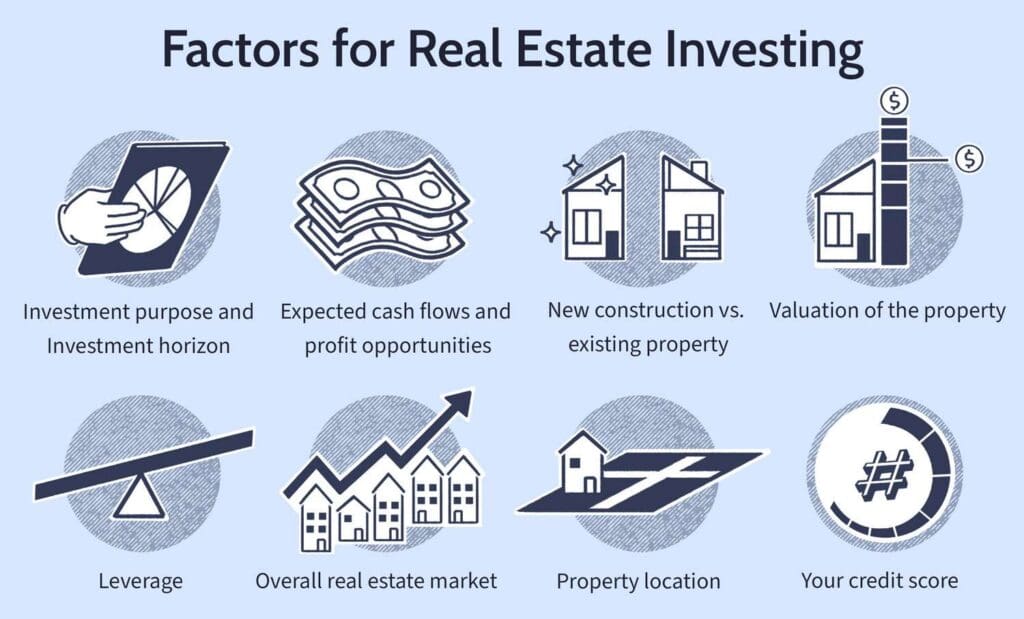How to Choose Good Investment Properties

How to Choose Good Investment Properties
Investing in real estate can be a lucrative venture, offering both long-term wealth accumulation and a steady income stream. However, choosing the right investment property requires careful consideration and strategic planning. Here are key factors to help you identify and choose good investment properties.
1. Location, Location, Location
The importance of location in real estate investment cannot be overstated. A property's location determines its desirability, rental income potential, and long-term appreciation. Look for properties in areas with:
- High demand: Properties in desirable neighborhoods with good schools, amenities, and low crime rates tend to attract more tenants and buyers.
- Growth potential: Invest in areas with planned infrastructure developments, new businesses, or upcoming public transportation projects. These can significantly boost property values over time.
- Accessibility: Proximity to major roads, public transport, and essential services like hospitals, shopping centers, and recreational facilities make properties more attractive to potential tenants.
2. Property Type and Condition
Different types of properties offer various investment opportunities and risks. Consider the following:
- Residential properties: Single-family homes, condos, and multi-family units are popular choices for investors. Evaluate the demand for rental properties in the area and the type of tenants they attract.
- Commercial properties: Office buildings, retail spaces, and industrial properties can provide higher returns but often come with higher risks and management requirements.
- Condition: Assess the property's physical condition. Older properties may require significant repairs and maintenance, impacting your overall investment returns. A thorough inspection can help identify potential issues and renovation costs.
3. Market Trends and Economic Indicators
Stay informed about the local real estate market trends and economic indicators. These factors influence property values and rental income potential:
- Supply and demand: A high demand for properties with limited supply can drive up prices and rental rates. Conversely, an oversupply can lead to lower prices and rental income.
- Employment rates: Areas with strong job markets attract more residents, increasing the demand for rental properties.
- Interest rates: Low interest rates make financing more affordable, encouraging investment. However, rising rates can impact your mortgage costs and overall returns.
4. Financial Considerations
Carefully evaluate the financial aspects of any potential investment property:
- Purchase price: Ensure the property is priced competitively based on its condition, location, and market trends. Compare similar properties to determine a fair price.
- Financing: Explore various financing options, such as conventional loans, FHA loans, or investment property loans. Consider the interest rates, loan terms, and down payment requirements.
- Cash flow: Calculate the property's potential rental income versus expenses, including mortgage payments, property taxes, insurance, maintenance, and management fees. Positive cash flow is essential for a successful investment.
- Return on investment (ROI): Estimate your ROI by considering both rental income and potential appreciation. A good investment should offer a favorable ROI, aligning with your financial goals.
5. Risk Management
Mitigating risks is crucial for real estate investment success:
- Diversification: Avoid putting all your funds into one property or market. Diversifying your portfolio across different property types and locations can reduce risk.
- Tenant screening: Implement a thorough tenant screening process to reduce the risk of non-payment or property damage. Reliable tenants are key to maintaining steady cash flow.
- Insurance: Obtain comprehensive property insurance to protect against potential losses from natural disasters, theft, or liability claims.
6. Professional Guidance
Navigating the real estate market can be complex, especially for new investors. Consider seeking professional guidance:
- Real estate agents: Experienced agents can provide valuable insights into the local market, help identify promising properties, and negotiate favorable terms.
- Property managers: If managing the property yourself is not feasible, a property manager can handle tenant relations, maintenance, and rent collection.
- Financial advisors: Consult with a financial advisor to ensure your investment aligns with your overall financial plan and goals.
Make a Smart Decision Upfront
Choosing the right investment property involves a combination of strategic planning, market research, and financial analysis. By considering location, property type, market trends, financial factors, and risk management, you can make informed decisions that maximize your investment returns. Remember, seeking professional guidance upfront can also help you navigate the complexities of real estate investment and achieve long-term success.
Want to Talk About Investing?
Our experts offer free consultations. Call now to schedule a meeting today!





